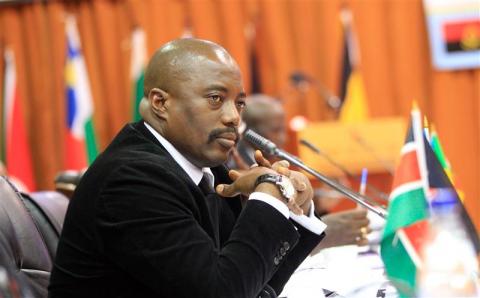Advertisement
Congo's Kabila Opens National Dialogue Boycotted By Opposition Leader
DAKAR (Reuters) - Congo President Joseph Kabila opened two weeks of national dialogue with opposition parties and civic groups on Saturday, but several senior figures stayed away, accusing him of trying to seek a third term in violation of the constitution.
Kabila, who is legally barred from standing in the 2016 presidential election, said the talks would address the poor functioning of state institutions and the simmering violence in the east where M23 rebels launched an uprising 18 months ago.
The talks, which Kabila has tried to launch since November, come as Democratic Republic of Congo's army has scored a rare success against the rebels thanks to the support of a new U.N. combat brigade, boosting the president's standing at home.
Rebel and government negotiators are due to go back to the negotiating table in the Ugandan capital Kampala on Monday after a summit of regional leaders on Thursday set them a two-week deadline for striking a peace deal.
"No effort will be spared to ensure the meetings in Kampala lead to the restoration of peace and state authority across the full extent of the country," Kabila told hundreds of delegates in the Congolese parliament. "If that does not occur, the armed forces will resume their duties."
In his first public speech in months, Kabila said the political dialogue in Kinshasa was a necessary accompaniment to the negotiations with the M23 if peace was to be restored after two decades of violence in eastern Congo.
Millions of people have died from violence, disease and hunger since the 1990s as foreign-backed insurgent groups have fought for control of the region's rich deposits of gold, diamonds and tin.
The president, who took over the presidency after the 2001 assassination of his father Laurent Kabila, said he was determined to reinforce the strength of the Congolese state. The absence of state institutions and the rule of laws is often cited as one factor generating violence in the east.
Etienne Tshisekedi, Kabila's main political rival, has refused to participate in the dialogues. The veteran opposition leader says he was cheated out of a presidential election win in 2011, something Kabila strongly denies.
Tshisekedi's spokesman, Albert Moleka, suggested the talks were a means for Kabila to boost his popular legitimacy as he prepares to reform the constitution and seek a third term.
"The interests of the Congolese people and the current problems ... are not the centre of this forum," Moleka told Reuters. A spokesman for Kabila was not immediately available for comment.
The national dialogue was postponed a number of times as delegates quibbled over the value of per diems for attending the conference - reportedly hundreds of dollars per day - and opposition politicians debated whether to participate.
Some politicians outside the coalition of parties loyal to Kabila did show up for the opening ceremony. Civic groups and traditional tribal leaders were also present.



















Add new comment